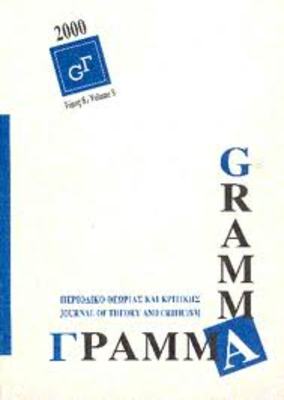Writing a “War” novel : self-referentiality and post-national critique in Toni Morrison’s Paradise
Part of : Γράμμα : περιοδικό θεωρίας και κριτικής ; Vol.16, No.1, 2008, pages 67-84
Issue:
Pages:
67-84
Section Title:
Writing war
Author:
Abstract:
This essay argues for the centrality of the theme of war in Toni Morrison's 1997 novel Paradise, and analyses the treatment of this theme in relation to Morrison's previous fiction and the work of other contemporary African-American writers. In particular, I argue that Morrison's fiction contests the narration of war as a break in the continuity of the nation, and as a strategic opportunity to represent the nation to itself—a representation open to recontainment within an ongoing narrative of national progress. This reading of war as a theme in Paradise is developed through an analysis of Rey Chow's recent work on war and "self-referentiality" in the post-Cold War era, in which the time and space of war are no longer in opposition to the time and space of the nation, but are coterminous with the globalized and fragmented nation of the contemporary era. I further argue that the novel's analysis of the production of authority and the performance of power can be understood in terms of the construction of a visual order of knowledge characteristic of the "world as picture" that Martin Heidegger identifies as key to the metaphysics of the modem age, and that Chow locates in the doctrine of U.S. exceptionalism in the Cold War era and after. This essay then develops the analysis of exceptionalist discourse applied to the novel in criticism thus far, to argue that the novel explores the use of exceptionalist discourse not only in the nation at large, but particularly in the nation at war. I therefore argue that the novel can usefully be understood as "post-national" in the critical sense of the term, in that the novel both resists the totality of a single national narrative, and the possibility of the "post-war nation.
Subject (LC):
Notes:
Revisiting crisis / reflecting on conflict: American literary interpretations from World War II to Ground Zero., This article was written with the support of a Post-Doctoral Fellowship funded by the Irish Research Council for the Humanities and Social Sciences., Περιέχει βιβλιογραφία




